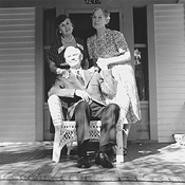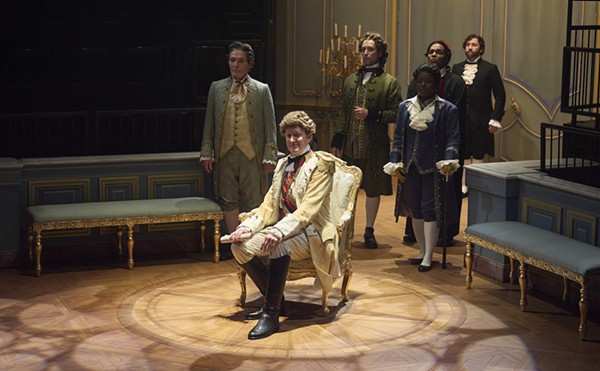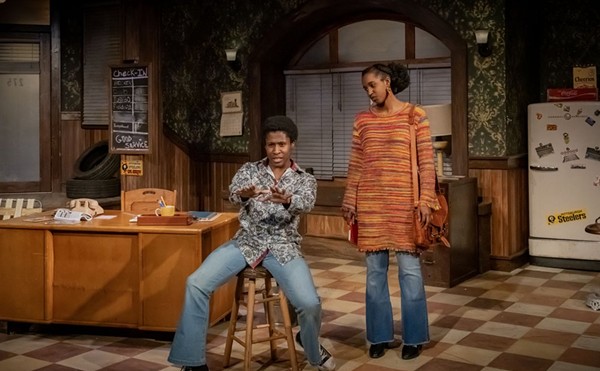Morning's at Seven is in every way an anomaly, a one-of-a-kind, eccentric masterpiece by Paul Osborn that was too wry and gentle for the tastes of 1939 audiences.
Osborn was an adept craftsman, a theatrical carpenter who specialized in refurbishing novels such as On Borrowed Time and The World of Suzy Wong into Broadway edifices for the great unwashed. To his shame is a leaden screenplay of South Pacific that sank Rodgers and Hammerstein's great musical 20,000 leagues under the sea. Yet, Morning redeems Osborn from the hacks' graveyard. Like the creators of Member of the Wedding, Harvey, and Arsenic and Old Lace, he's a one-trick-pony playwright, and this is his one chance at immortality.
In the labyrinthine plot, seven senior citizens try to come to terms with the various compromises that have stinted their lives. Ancient marriages start to crumble, placid wives plan one last rebellion before the grave, and a prehistoric ménage à trois pops out of the closet like a forgotten cannonball. The son of one of the couples, a 40-year-old manchild, has to face up to his manhood when confronted with his perennial fiancée's unexpected pregnancy.
Here is one of the few plays to chronicle the emotional lives of seniors: a humane comedy that, on the surface, portrays a Norman Rockwell universe of rosy-cheeked grannies in snoods, gossiping across clotheslines. Underneath the surface sweetness, it is as shrewd and knowing of pre-war mid-America as Grant Wood's "American Gothic." Full of longing and regret, Osborn's play steeps us in a brash version of Mark Twain's small-town America, made up of wise fools.
Those weaned on the small-town life portrayed in a plethora of plays and films will be at home here. In quaint, tree-lined streets that seem to bask in a perpetual summer, everything appears as orderly and placid as the lace aprons donned by each matron. Yet behind the primroses and trellises, each of Osborn's buzzing denizens harbors a personally embroidered regret. What makes the play endearing is an unflagging optimism. Though we are exposed to blighted marriages, unfulfilled spinsters, emotionally crippled middle-aged men, and confused senior citizens still searching for the right path, the evening never loses its implacable bonhomie.
Don Bianchi's extraordinarily loving guidance weaves the evening's nine intricate performances into an epic Walt Whitman sampler of egotism and camaraderie. The ensemble is so evenly matched, it would take a catalog the size of Montgomery Ward's to list all its virtues. Yet it would be borderline blasphemy not to enumerate Dorothy Silver's contributions. Her Aaronetta Gibbs is rendered as frantic as a firefly. With sadly girlish hair-ribbons incongruently popping out of iron-gray curls, she is a portrait of arrested girlhood in her flounces and ruffles.
Reuben Silver's perplexed husband, a melancholy repairman who yearned to be a dentist, is all hangdog, elfin vulnerability, sadly and sweetly suggesting a defrocked toymaker.
When the human condition is unrolled with such love and good cheer, it makes a wonderful refresher course in how to successfully inhabit the land.
Now that Susan Schulman's slickly directed tour of The Sound of Music has come to town, we can once again expect those pompous bores who hold this musical in contempt to make snide references to "the sound of mucus." Though a bit thick in its sentiment, it remains the ultimate wish-fulfillment fantasy concerning children, nuns, and Nazis.
One could have wished that this revival had the courage to remain true to the 1959 original and not have filched so much material from the more famous film version, which altered the order of the songs and replaced some of them.
Meg Tolin's Maria is perpetually perky in the Florence Henderson manner, making for an unsurprising but perfectly competent road-company Maria. The evening's most pleasant surprise comes in the redheaded, brittle vamping of Rachel DeBenedet as the show's other woman, Elsa Schraeder.
The raison d'être of this tour is Richard Chamberlain. At least from Row Z, the decades have not made him pucker on the vine. Aristocratic, still exuding the illusion of boyish beauty, and possessing a more than competent singing voice, he is an ideal Baron von Trapp. If you plan to attend, beware of matrons waving their panties in the air at the sight of the autumnal Dr. Kildare.
The Sound of Music. Through November 21 at the Palace Theatre, 1519 Euclid Avenue, Playhouse Square. 216-241-6000.












